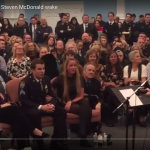All too often today, we judge people’s lives not on their inherent value and dignity, but by what they can contribute to the world, by whether or not their lives are a “burden.” Our culture is slipping down a dangerous slope which says that these lives have no purpose and are not worth living. Some even go so far as to deem it “compassionate” to end these lives.
The testimony of real people, though, proves that every life does have value, no matter how powerless that life may seem.
The other day on Facebook, I saw that Monica Gabriel – a fellow Sirius-XM Catholic Channel radio host who’s also a “Verily” magazine contributor – shared the news that her young nephew, John Paul Kilner, had passed away. Over the weekend, Tim Carney – John Paul’s uncle and “Washington Examiner” columnist – shared a beautiful reflection about the meaning of this young child’s life and death.
Here are some excerpts:
Nothing can prepare you for seeing your one-year-old nephew in a casket. Nothing can take away his parents’ agony. And nobody could have expected how much good work this helpless baby would do in 14 months.
John Paul Kilner was born with an advanced case of spinal muscular atrophy. Nearly paralyzed at birth, his body deteriorated further as he grew.
My sister-in-law Elena and her husband Pat brought JP home as soon as possible, and began the 24-hour a day job of keeping him alive. Someone was always at JP’s side, monitoring blood-oxygen levels, suctioning mucus through his tracheostomy tube.
If Elena’s younger sister Suzanne (now a nurse) or a hired nurse named Donnisse weren’t on duty, either Pat or Elena did without sleep.
Daily saving the life of an immobile kid with a fatal disease raises some fundamental questions. What is the point of such a life? Which raises the prior question: What is the purpose of any life?
Pat and Elena are devout Catholics from strong families, but their answer to this question can’t be set aside as some teaching in the Catechism. It’s a truth written on the human heart.
Jesus said that the two greatest commandments are to love God and love your neighbor. This is our purpose. This view is not uniquely Christian. It’s understood in other religions and in secular worldviews.
In this regard, John Paul lived a superior life. He exuded love. Before he lost control of his facial muscles, he beamed smiles that made grown men sob. Babies can love those around him with the pure, unconditional love we all should show.
Also, JP drew love from others. Neighbors, relatives and strangers cooked meals and gave time, equipment and money to help the Kilners. JP’s brothers and sister showered him with affection. And Pat and Elena sacrificed immensely to care for him…
…Tribulations both reveal character and form it. JP’s struggles revealed his parents’ heroic virtue and fostered virtue in others.
Pat and Elena saw John Paul as a blessing, and they generously shared that blessing with the world. They took him wherever they could, in a chair rigged with a ventilator and an IV. Elena shared wider, by penning hopeful, contemplative letters to John Paul every few weeks, which she posted on a blog.
One friend of mine, who never met the Kilners, read the “Letters to John Paul” blog. She wrote me, “John Paul’s story made me want to be a better person.”…
…More than 500 people attended the beautiful funeral. One non-Catholic mourner was moved so much by the Mass she told Pat, “Now I understand why you’re Catholic.”
John Paul, who never spoke a word in his life, was the greatest evangelist of love, faith, virtue and hope I have ever met.
Go read the whole article. Then offer some prayers for the family.











